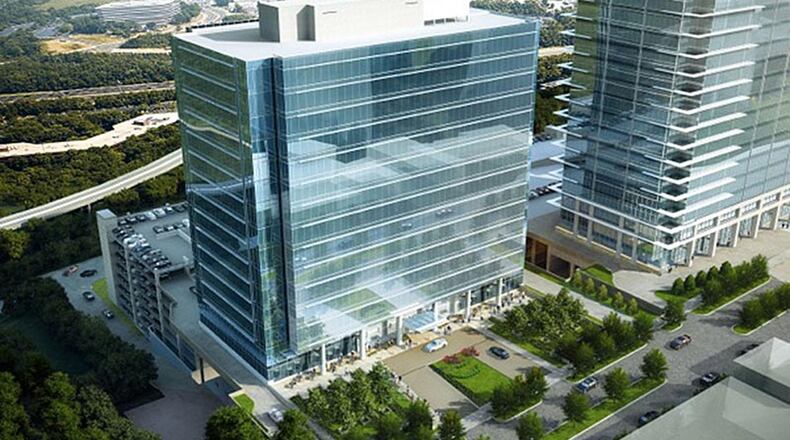2015 DeKalb business development
- Seven Oaks Company: Up to 1,350 employees could be located in a $143 million, 15-story office tower planned for the Perimeter Summit office complex. Tax breaks: $6.3 million
- Cox Automotive HQ: 1,200 jobs move from Fulton County to DeKalb County through a $100 million building renovation and expansion. Tax breaks: $6 million
- Source One Direct: 100 jobs created at a $30 million credit card customization facility expansion. Tax breaks: $1.1 million
- Eurofins Genomics: 78 new jobs in DNA research with a $22 million investment in a Tucker location. Tax breaks: Pending
Note: Cox Automotive and The Atlanta Journal-Constitution are both owned by Cox Enterprises.
Source: Decide DeKalb Development Authority
Metro business growth since 2011
Fulton: 24,446 jobs, $2.9 billion in investment
Gwinnett: 8,500 jobs, $938 million in investment
Cobb: 5,702 jobs, $330 million in investment
DeKalb: 7,164 jobs, $175 million in investment
Note: 3,000 of jobs created in DeKalb were announced by State Farm.
Source: Georgia Department of Economic Development
With code names like "Project Infinity" and "Project Hush," more than two dozen companies are looking to relocate or expand in DeKalb County, lured in part by lucrative tax breaks.
These businesses have the potential to add and retain as many as 3,281 jobs, attracting nearly $500 million worth of private investment, according to the Decide DeKalb Development Authority, the economic development arm of the county's government. Many of these companies are expected to decide this year whether to locate in DeKalb.
Despite booming growth along the northern Perimeter, DeKalb has lagged behind other core metro Atlanta counties as the region has recovered from the recession. The county's reputation was harmed by government corruption and an underperforming public school system, leading companies to locate elsewhere.
But aided by fierce recruitment and tax incentives, the business landscape may be changing in the county of 735,000 residents.
The development authority greatly increased its business development efforts last year, closing on projects with about 2,000 jobs and nearly $300 million in investment. That's about double as much activity as the agency handled during 2014.
“We’re hopefully entering a period where we’re going to continue seeing growth and interest,” said Ray Gilley, president of the Decide DeKalb Development Authority. “It’s the accessibility and the affordability — we’re close to the airport, we have a very much improving school district, and we’re a county that has a critical mass in terms of workforce.”
DeKalb could use the businesses and the jobs that come with them.
The county trailed Fulton, Cobb and Gwinnett counties in business projects and investment since January 2011, according to figures from the Georgia Department of Economic Development. Median household incomes of $50,799 also trailed the region, Census figures show.
More than 7,100 jobs were added in DeKalb during that time, although 3,000 of them were created by one business — State Farm, which announced an expansion in Dunwoody. By comparison, jobs increased by 24,446 in Fulton, 8,500 in Gwinnett and 5,702 in Cobb. While DeKalb outpaced Cobb in jobs, Cobb brought in a higher number of businesses and investment.
“There’s no reason companies shouldn’t be coming here,” said Chris Carr, a Dunwoody resident and the commissioner of the Georgia Department of Economic Development, during a February meeting with state legislators from DeKalb. “There’s an environment that’s been created, and the companies are just choosing someplace else.”
The county’s development authority is in talks with 27 companies in a variety of industries: manufacturing, technology, film post-production, construction and back-office administration, Gilley said. The identities of the prospective companies won’t be made public until they seek tax incentives. He hopes at least half of them choose to move forward with plans in DeKalb.
The development authority has the power to provide property tax breaks through complicated bond deals that are based on the value of a company’s investment.
These kinds of tax abatements are used throughout Georgia, and they're one of the state's most powerful economic development tools. The potential value of the incentives won't be revealed until they come to votes of the development authority's board.
"This is an opportunity to see what we're made of," said Katerina Taylor, president and CEO of the DeKalb Chamber of Commerce. Taylor said of the potential to lure businesses to DeKalb. "All our resources are what really attract major companies and brands to this county."
An influx of business interest in DeKalb would benefit residents and change perceptions about the county, said Ann Rosenthal, president of the Tucker-Northlake Community Improvement District.
“The county has a record in the past few years of not being able to pull it together. That is starting to change,” she said. “We are sitting on a gold mine.”
About the Author
Keep Reading
The Latest
Featured





